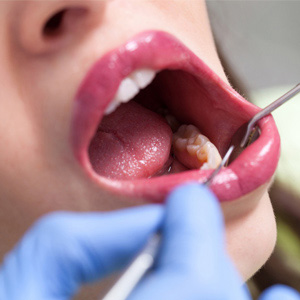An estimated 50,000 Americans are expected to be diagnosed this year with some form of oral cancer. Five years from now, if current survival rates still apply (57%), a little more than half will still be alive. That’s why the Oral Cancer Foundation designates each April as Oral Cancer Awareness Month to call attention to this serious disease, and what you can do to lower your risk of contracting it.Oral cancer has one of the lowest survival rates among known cancers, mainly because it easily goes undetected until its later stages when known treatments aren’t as effective. Patients don’t always have overt symptoms or they mistake cancerous lesions for everyday mouth sores. On the other hand, early detection and treatment dramatically improve survivability.Here are some things you can do to reduce your risk for oral cancer or improve your odds for early detection.Don’t use tobacco. If you’re a smoker, you’re five to nine times more likely to develop oral cancer than a non-smoker. Using smokeless snuff or chewing tobacco is also risky—four times the risk of non-users. And preliminary evidence suggests that e-cigarettes increase the risk of cancer as well.Make better food choices. A diet heavy in processed foods, especially nitrites used in curing meats and other products, can damage cellular DNA and lead to cancer. On the other hand, natural foods like fresh fruits and vegetables contain nutrients that lower cancer risk. A nutritious diet also contributes to healthier teeth and gums.Practice safer sex. While older adults have traditionally accounted for most oral cancer cases, there has been a recent, unsettling rise among younger people. Most researchers tie this to the Human Papilloma Virus (HPV 16), which is sexually transmitted. You can reduce your risk for contracting HPV 16 and subsequent oral cancer by following safe sex practices.Undergo oral cancer screenings. Your semi-annual dental visits to clean your teeth are also a prime opportunity to check for oral abnormalities, especially if you’re older. During an oral cancer screening we visually inspect your face, neck, lips and the inside of your mouth for any suspicious sores or discolorations. Early detection leads to better outcomes.You should also modify your alcohol consumption—moderate to heavy drinkers have three to nine times greater risk for oral cancer than light or non-drinkers. And, you can further lower your risk of lip cancers by limiting your exposure to the sun and wearing protective sunscreen.Oral cancer is a dangerous condition that could threaten your life. Regular dental care and healthy lifestyle practices can help lower your risk for encountering this deadly disease.If you would like more information about oral cancer, please contact us or schedule a consultation. To learn more, read the Dear Doctor magazine article “Diet and Prevention of Oral Cancer.”
Recent Posts
- The Importance of Emergency Dental Care: Timely Intervention is Key
- Delaying Wisdom Teeth Extraction Can Lead to Serious Issues
- Can an Abscessed Tooth Kill You? Symptoms and When to Seek Urgent Care
- How to Recognize and Effectively Treat a Dental Emergency
- Gum Disease and Heart Disease: Understanding the Connection

